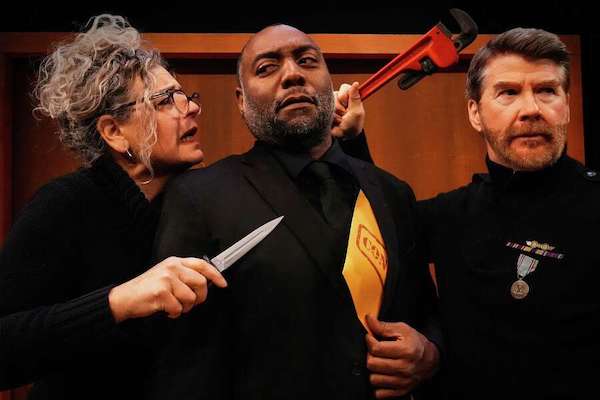
Sandy Rustin. In her study. With a bludgeon.
I hereby declare the playwright of “Clue,” which is now on stage of the San Francisco Playhouse, guilty of the comedic equivalent to bloody murder: Anemic humor.
While attempting to ensnare audiences in a non-stop flurry of rim shots, her script thumps us into the doldrums.
All the mugging and capering that director Susi Damilano and choreographer Nicole Helfer can coax out of their plucky 11 member cast is not enough to keep this stage adaptation of a film adaptation of a board game from feeling flat and overlong, even at just over 90 minutes.
“My apologies,” says Colonel Mustard (played with delicious obliviousness by Michael Ray Wisely) early on in the proceedings, “I struggle with nuance.”
His line is an appropriate epigram for “Clue” as a whole. It’s a toothless confection of silly slapstick and would-be witticisms
While one might generously credit the show as aspiring to the ingenious mayhem of Michael Frayn’s “Noises Off!” or even the parodic, chaotic fun of Patrick Barlow’s spin on Hitchcock’s “The 39 Steps,” my more cynical take is that Rustin and the other “Clue” creators’ motives are far more commercial than artistic (Rustin’s script has been aided and abetted by “additional material”- never a good sign -from Hunter Foster and Eric Price).
Look, I hold no grudge with a high-quality independent local theater like San Francisco Playhouse for adding the likes of “Clue” to their varied season’s mix. My harshing aside, this show has a kind of mass appeal that’s virtually critic proof and can help underwrite more profound fare (like the Playhouse’s recent “Indecent” and “Follies”) by pulling in ticket buyers who don’t habitually attend theater or read the works of theater critics.
The dead don’t rise
But for afficionados who regularly patronize Bay Area stages and turn to critics for intellectual arguments as much as consumer advice, “Clue” will prove a losing game. This production simply doesn’t consistently deliver enough of the vaudeville precision and finely caricatured characters that could help it transcend the blah blueprint of its script.
Wonderfully fusty Professor Mustard is counterbalanced by a frustratingly nondescript Professor Plum (Michael Gene Sullivan). Vivid vavoomy French maid, Yvette (Margherita Ventura), is offset by a befuddling butler/host (Dorian Lockett, who on opening night repeatedly flubbed lines). Mrs. Peacock (Stacy Ross), is described by another character as a nasty old lady, but more often comes off as middle-aged ditz.
And Greg Ayers, whose high-kneed prancing as Mr. Green is a consistent delight, is undermined by some really retrograde homophobia in the script (While the play is theoretically set in the 1950s, it was written in the 2010s, and period references essentially disappear after the first few scenes).
While the individual character performances are of inconsistent quality, when the cast moves en masse to explore Heather Kenyon’s handsome manor house set, full of nifty hidden rooms that slide in and fold-out like illustrations in a pop-up book, its synchronized movement is a hoot. Sliding side-by-side like a chain of paper dolls or tiptoeing in a prissy phalanx, they’re the perfect herd of ninnies.
As muddily as some of the color-coded characters are played, their rakish costumes (designed by Alice Ruiz) sort them out in glorious detail: Mrs. Peacock’s fascinator and petticoats are divine. The black-on-black mourning suit worn by secretive Mrs. White (Renee Rogoff) is a smashingly fashionable paradox.
Still, despite its staging and style strengths, this burlesque of a murder mystery is moribund on arrival and never gets zhuzed up beyond zombiedom. All in all, I’d rather be clueless (And yes, there’s a stage version of that as well).
